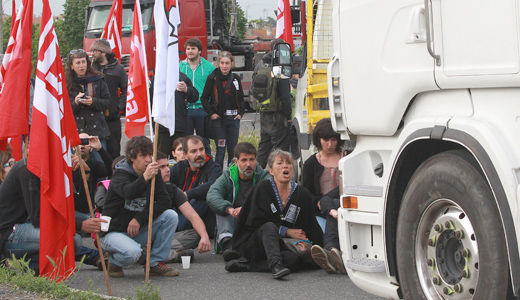
PARIS, France – Hundreds of thousands of union members, workers and students have taken to the streets here over the past week. Additional protests and strikes are planned for the coming days, as air traffic controllers, railway, port and other transport workers plan ongoing work stoppages.
It is possible that parts of France, including Paris, will come to a screeching halt in the days to come.
Only two of France’s eight oil refineries are fully operational, as plant workers have also gone on strike, causing the French government to dip into emergency oil reserves. Gas stations and fuel depots have been barricaded, too, causing gas shortages and travel delays.
Additionally, local transport strikes have been called in ten different cities and towns scheduled to host the Euro 2016 Football Championships, which starts on June 10. 2.5 million fans are expected to attend the tournament.
At issue is a May 17 presidential decree, a so-called labor law reform that would make it easier for employers to hire and fire employees and negotiate individual labor contracts outside of industry-wide accords, particularly in the transportation industry.
The decree is largely seen as an abuse of executive power, as it bypasses the French legislative process, precisely because it is disliked by an overwhelming majority of French citizens. According to a recent poll, only thirteen percent of French citizens support the decree in its current form.
Prime Minister Manuel Valls, nominally a member of the Socialist Party, and Jean-Christophe Cambadelis, the Socialist Party’s secretary general, have both lashed out at the striking unions.
Union members and ordinary workers say they feel betrayed by both the Valls administration and the Socialist Party.
The French National Front, a far right-wing party, is blaming Syrian and Iraqi refugees and immigrants, as well as the Roma people, also known as Gypsies, for high unemployment – which Valls claims justifies his decree. He claims he is trying to create a more welcoming business climate in the hopes of lowering unemployment.
The CGT (General Confederation of Labor), France’s biggest and oldest union federation, plans ongoing strike actions and work stoppages until the reform law is withdrawn.
Additionally, many workers see Philippe Martinez, the new CGT leader, as a dynamic personality with the support to dramatically reshape and rebuild a labor movement that had been declining in influence and power.
Only about eight percent of French workers actually belong to unions. Agreements negotiated by unions apply to all employees regardless of membership, thereby giving the unions a much larger social-economic impact than their dues-paying numbers would suggest.
Additionally, many French workers follow the unions politically, and support strikes and demonstrations.
Consequently, French workers have a thirty-five-hour work week, another example of the benefits enjoyed by most citizens regardless of union membership. The CGT – and some other federations – are known for their militancy, standing-up for the rights of all workers, not just those in specific jurisdictions, industries, trades or job classifications.
Lydia Samarbakhsh, international affairs coordinator for the French Communist Party (PCF), told the People’s World, “the trade unions, especially the CGT, is trying to block the Prime Minister’s actions every step of the way, including by calling a general strike.”
Additionally, she continued, “the PCF is involved in the mobilizations against the decree and working to unite left forces opposed to the rightist policies led by Valls. For the first time since 2012, the anger within the left has led to mass mobilizations and demonstrations.”
As the strikes intensify over the coming days, the PCF will be holding its National Congress and discussing the challenges facing the French working class.
“The political landscape, the building of a common political platform to defeat right and far-right parties” in the 2017 presidential and general elections is a priority, Samarbakhsh emphasized.
Arguably, popular anger over the labor reform law could increase in coming months and signal a political sea change prior to the 2017 elections.
Further, France’s working class is quite possibly acting as a bulwark against the further erosion of workers’ rights throughout all of Europe. Stopping austerity is a fundamental and urgent question for the French working class, and all workers.
While the ultimate result of the on-going strikes is yet to be determined – neither Valls nor the CGT have any plans to back down – one thing is certain: business as usual has come to a stop in France.
Video: 1,2 million de personnes dans les rues contre le projet de loi El Khomri, l’Humanité
Photo: Union activists block the entrance of the industrial area in Boucau, southwestern France, on a day of nationwide strikes and protests over a labor reform, May 26. Bob Edme | AP

MOST POPULAR TODAY


Zionist organizations leading campaign to stop ceasefire resolutions in D.C. area

High Court essentially bans demonstrations, freedom of assembly in Deep South

Afghanistan’s socialist years: The promising future killed off by U.S. imperialism

Communist Karol Cariola elected president of Chile’s legislature






Comments